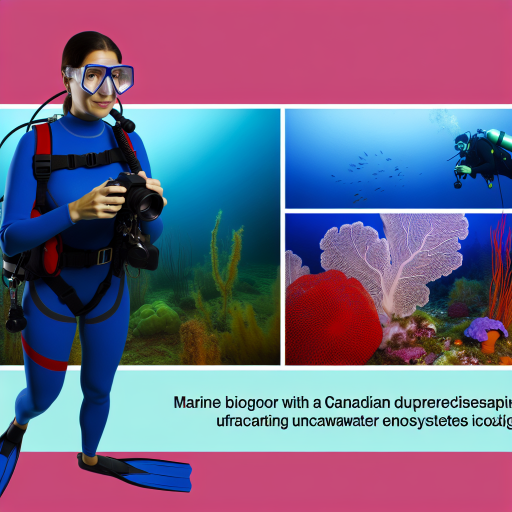Introduction
Artificial Intelligence (AI) refers to the simulation of human intelligence in machines.
It allows computers to perform tasks that typically require human cognition.
In scientific research, AI analyzes large data sets, recognizes patterns, and automates complex processes.
These capabilities enhance research efficiency and accuracy.
Canada’s research landscape boasts diverse fields, including health, environmental science, and technology.
Major universities and government institutions drive innovation in these areas.
Collaborations between academia and industry foster groundbreaking discoveries.
As Canada invests heavily in research, it aims to position itself as a global leader.
Exploring AI’s impact on scientific research careers in Canada is crucial.
AI technologies are reshaping how researchers work and engage with their fields.
Many professions in science now require proficiency in AI tools and techniques.
Researchers must adapt to these advancements to remain competitive.
AI enhances data analysis, enabling faster decision-making.
It streamlines research processes, which allows scientists to focus on critical thinking and creativity.
Consequently, researchers skilled in AI gain a competitive edge in securing funding and collaboration opportunities.
The integration of AI into research careers also demands new skill sets.
Scientists must learn programming languages, statistical methods, and AI-specific algorithms.
Universities and institutions are already adapting curricula to meet these needs.
This evolution promotes an adaptable workforce prepared for future challenges.
Moreover, AI-driven projects foster interdisciplinary collaboration.
They merge expertise from computer science, engineering, and traditional sciences.
This collaboration expands research horizons and leads to innovative solutions for complex problems.
Therefore, the relevance of AI in scientific research continues to grow.
Understanding its impact on careers in Canada will help shape the future of research.
As AI transforms the landscape, researchers must embrace these changes to thrive in their fields.
The Current State of AI in Canadian Scientific Research
AI adoption in Canadian scientific research has reached an impressive scale.
Research institutions across the country increasingly leverage AI technologies to enhance their work.
According to recent statistics, over 50% of leading research institutions in Canada now use AI in some form.
This shift has become a game-changer in various scientific fields.
Here’s a closer look at AI’s current state in Canadian research.
Statistics on AI Adoption
- As of 2023, approximately 60% of Canadian universities reported AI initiatives.
- Research funding for AI-specific projects has increased by 25% over the past two years.
- At least 40% of research teams actively utilize AI technologies in their projects.
- Roughly 70% of AI researchers in Canada collaborate across different scientific disciplines.
- Over 80% of institutions plan to integrate AI in research within the next five years.
These statistics demonstrate a robust commitment to integrating AI in scientific research across Canada.
Research institutions recognize the potential of AI to enhance efficiency, accuracy, and innovation.
The adoption rates reflect a growing optimism regarding AI’s role in advancing scientific inquiry.
Successful AI Applications in Various Scientific Fields
AI technologies are reshaping many scientific domains.
Here are a few notable examples:
- Biology: AI algorithms assist in gene sequencing and protein structure prediction.
The use of machine learning has significantly sped up these processes.
For instance, DeepMind’s AlphaFold has revolutionized our understanding of protein folding. - Environmental Science: Researchers employ AI to analyze climate data and predict environmental changes.
AI models help assess the impact of human activities on ecosystems.
Organizations also use AI to enhance conservation efforts through more informed decision-making. - Medical Research: AI facilitates drug discovery by analyzing vast datasets.
Researchers can identify potential drug candidates faster.
Machine learning enhances diagnostic tools, enabling earlier detection of diseases. - Astronomy: Scientists utilize AI to process large amounts of astronomical data.
AI-based systems help in identifying celestial objects and phenomena.
This technology plays a crucial role in expediting discoveries in space research. - Physics: AI applications in physics include simulations and data analysis.
AI algorithms analyze experimental data to uncover patterns.
This capability leads to significant advancements in our understanding of fundamental physical principles.
These examples illustrate that AI has permeated various scientific fields.
Researchers are leveraging AI’s capabilities to push the boundaries of knowledge.
Their projects yield groundbreaking discoveries and enhance the overall research landscape in Canada.
Government Initiatives to Support AI Integration
The Canadian government recognizes the importance of AI in scientific research.
They have launched several initiatives to promote its integration.
Here are key initiatives aimed at supporting AI research:
- Investment in Research Funding: The government committed to investing over $400 million in AI research budgets.
This funding targets both foundational research and applied projects. - Creation of Collaborative Networks: The government fosters partnerships among universities, industry, and research institutions.
These collaborations enhance AI research application and commercialization. - Establishment of AI Research Institutes: Several institutes across Canada focus explicitly on AI research.
They provide resources and support for interdisciplinary projects. - Support for Startups: The government provides funding and resources for AI startups.
This effort aims to encourage innovation and foster growth in the tech sector. - Training and Education Programs: Various training initiatives aim to enhance AI literacy.
Programs target students, researchers, and industry professionals to ensure a skilled workforce.
These initiatives highlight the government’s proactive stance.
By investing in AI, Canada takes significant steps towards a more innovative scientific community.
These measures help researchers integrate AI seamlessly into their projects.
Challenges and Considerations
Despite the positive trends, certain challenges remain.
Here are some key issues that could hinder AI adoption in scientific research:
- Data Privacy Regulations: Stricter regulations may impact data availability for research.
Researchers must navigate complex compliance issues. - Skill Gaps: While interest in AI grows, there’s a scarcity of qualified professionals in the field.
Institutions face challenges in finding skilled individuals to implement AI solutions. - Funding Disparities: Some regions receive more funding than others.
This imbalance can lead to unequal progress in AI adoption across Canada. - Ethical Considerations: The use of AI raises ethical questions, especially regarding data handling.
Researchers must address these concerns proactively. - Integration into Established Practices: Incorporating AI into traditional research methodologies can be challenging.
Scientists may resist adopting new technologies.
Addressing these challenges is crucial for the continued success of AI in Canadian scientific research.
Stakeholders must collaborate to create solutions that foster growth while mitigating risks.
Emphasizing training and ethical considerations will pave the way for smoother integration.
The current state of AI in Canadian scientific research reflects significant progress and promise.
The combination of robust adoption statistics, successful applications, and government support creates an encouraging environment.
Nevertheless, addressing challenges will be essential for ensuring sustained growth and innovation.
With collaborative efforts, the future of AI in Canadian research looks bright.
Ultimately, AI has the potential to revolutionize how scientific research is conducted.
As Canada continues to embrace these advancements, researchers and institutions can look forward to an exciting and transformative future.
AI Technologies Transforming Research Methodologies
Artificial Intelligence (AI) technologies are revolutionizing research methodologies across various scientific domains in Canada.
Researchers now harness the capabilities of machine learning, data mining, and natural language processing to improve their outcomes and accelerate their research processes.
The impact of AI is profound, allowing scientists to explore new avenues and gain insights that were once impossible.
Machine Learning in Research
Machine learning (ML) is a branch of AI that involves algorithms that learn from data.
Researchers use ML algorithms to identify patterns and make predictions.
This capability is essential for analyzing large datasets that would overwhelm traditional methods.
ML enables scientists to:
- Analyze genomic data for personalized medicine.
- Predict outcomes of clinical trials more accurately.
- Improve image recognition in medical imaging technologies.
For example, in drug discovery, machine learning algorithms process vast amounts of biological and chemical data.
This helps identify potential drug candidates faster than conventional methods.
By leveraging ML, researchers can validate hypotheses and streamline the identification of promising leads.
Data Mining in Scientific Research
Data mining involves extracting meaningful information from large datasets.
Researchers apply various data mining techniques to uncover hidden patterns and relationships within their data.
Benefits of data mining include:
- Enhancing the reliability of experimental results.
- Providing insights into complex phenomena.
- Facilitating the discovery of new scientific knowledge.
In Canadian environmental research, data mining plays a critical role in analyzing climate change data.
Researchers can examine historical climate patterns, assess their impacts, and predict future changes.
Through data mining, they identify correlations between human activities and climate outcomes, leading to more informed policy decisions.
Natural Language Processing (NLP) in Research
Natural language processing allows computers to understand and interpret human language.
Researchers utilize NLP to analyze vast amounts of textual data found in scientific literature.
This technique enhances research by:
- Automating literature reviews.
- Summarizing findings from numerous studies.
- Identifying emerging trends in research topics.
For instance, NLP tools can scan thousands of research papers and extract relevant information on specific subjects.
Researchers can save time and focus on interpreting results, leading to quicker advancements in their fields.
NLP disclosures assist scientists in navigating the expanding body of research literature more efficiently.
Case Studies: AI Tools in Action
The integration of AI tools into scientific research has proven impactful through various case studies.
Some notable examples include:
Unlock Your Career Potential
Visualize a clear path to success with our tailored Career Consulting service. Personalized insights in just 1-3 days.
Get StartedDrug Discovery
One compelling case study involved AI in drug discovery for cancer treatment.
Researchers at a Canadian biotechnology firm utilized machine learning algorithms to screen existing medications.
They aimed to find potential new uses for these drugs.
The AI model identified promising candidates that traditional methods overlooked.
This approach drastically reduced the time and cost involved in developing new therapies.
Climate Modeling
Another case study highlighted the use of AI in climate modeling.
Scientists at a Canadian research institution used machine learning to analyze oceanographic data.
The goal was to predict ocean temperature changes and their impact on local ecosystems.
They found that AI could analyze complex data sets far more efficiently than traditional models.
Agriculture Optimization
In agriculture, AI tools have enhanced precision farming techniques across Canada.
Researchers used data mining and machine learning to analyze soil conditions and crop health.
By applying these insights, farmers could optimize their yields while minimizing environmental impact.
How AI Accelerates Research Processes
AI technologies accelerate research processes in several significant ways:
- Efficiency: AI automates time-consuming tasks, freeing researchers to focus on analysis.
- Scalability: AI can manage and analyze vast datasets, expanding the research scope.
- Collaboration: AI tools enhance collaboration by providing shared platforms for data analysis.
- Decision Support: AI aids decision-making by providing data-driven insights.
Researchers can now undertake complex studies previously deemed impractical due to data volume or statistical challenges.
As a result, the integration of AI into scientific research methodologies fosters innovation and paves the way for newfound discoveries.
AI technologies like machine learning, data mining, and natural language processing have transformed Canadian scientific research careers.
These tools enhance research methodologies and improve outcomes and efficiency.
The impact of AI is evident in diverse fields, from drug discovery to climate modeling.
As AI technologies continue to advance, they promise to unlock even greater potential in scientific research, ultimately benefiting society as a whole.
Read: How to Get Ahead in Canada’s Biomedical Research Sector
Impact on Research Job Roles and Skill Requirements
Artificial Intelligence (AI) has transformed many sectors, including scientific research.
In Canada, this transformation presents unique challenges and opportunities for researchers.
The integration of AI into research workflows significantly alters job roles and skill requirements.
This section explores how traditional research roles evolve in this AI-augmented landscape.
Traditional Versus AI-Augmented Research Roles
Research careers have historically encompassed a range of roles.
With AI’s emergence, researchers find themselves in a shifting landscape.
Traditional roles now coexist with new positions specifically designed for AI-centric processes.
Below are some key roles impacted:
- Data Scientists: These professionals analyze complex datasets using statistical techniques.
AI-enhanced tools streamline this work, allowing for quicker insights. - AI Specialists: These roles focus on the development and application of AI technologies.
They work closely with traditional researchers to implement AI solutions. - Bioinformaticians: In biological fields, these researchers now utilize AI to analyze genetic data more efficiently.
- Research Analysts: While they traditionally interpreted data manually, AI enables automated insights.
They must adapt to understand AI-generated analytics.
The introduction of AI creates a synergy between these roles.
Traditional researchers must collaborate with AI specialists to leverage technology effectively.
This collaboration enhances research quality and efficiency.
Skills Transition: Remaining Relevant in Research
The integration of AI necessitates a shift in the skill sets required for researchers.
Many traditional skills still hold value.
However, researchers must acquire new competencies.
The following skills are increasingly essential:
- Programming and Coding: Familiarity with programming languages like Python and R becomes crucial.
These languages underpin many AI tools and applications. - Data Analysis Techniques: Researchers must deepen their understanding of machine learning algorithms.
This knowledge enables them to interpret AI outputs accurately. - Statistical Knowledge: Advanced statistical techniques help validate AI findings.
Researchers should be fluent in both classical and modern statistical methods. - Interdisciplinary Knowledge: Understanding AI’s implications across various fields becomes increasingly important.
This knowledge fosters collaboration and innovation. - Ethics and AI Policy Understanding: As AI evolves, ethical considerations in research become paramount.
Researchers must educate themselves on the ethical implications of their work.
Adapting to these new skills requires a commitment to lifelong learning.
Workshops, courses, and online platforms offer valuable resources for researchers.
Institutions also play a crucial role in supporting this transition.
Universities should implement training programs focused on AI competencies.
Interdisciplinary Approaches: Merging AI with Traditional Scientific Disciplines
AI’s influence on research encourages an interdisciplinary approach.
Researchers from diverse fields must collaborate to advance knowledge and technology.
The following disciplines significantly benefit from AI integration:
- Healthcare: AI helps analyze patient data, predict disease outbreaks, and personalize treatments.
Collaboration between AI experts and healthcare researchers is invaluable. - Environmental Science: Researchers leverage AI for climate modeling and ecological forecasting.
Combining expertise in environmental science with AI leads to better predictive models. - Physics: AI assists in simulating complex physical systems.
Physicists and data scientists work together to enhance experimental design and analysis. - Social Sciences: AI can analyze social trends and behaviors through network analysis.
Social scientists must embrace data analytics to extract meaningful insights. - Engineering: AI optimizes design processes and predictive maintenance in engineering fields.
Collaborative efforts between engineers and AI specialists drive innovation.
This interdisciplinary approach fosters creativity and innovation.
Researchers can tackle complex challenges more effectively by merging expertise across fields.
Collaborative projects, buy-in from leadership, and institutional support can expedite this shift.
The impact of AI on research careers in Canada is profound.
Traditional roles evolve, demanding new skills and collaboration among researchers.
Those who embrace AI’s potential will flourish in this new landscape.
By investing in skills development and interdisciplinary collaboration, researchers can remain at the forefront of scientific advancement.
Ultimately, AI not only enhances research productivity but also deepens our understanding of complex challenges.
This evolution presents exciting opportunities for Canadian researchers to lead on the global stage.
Read: The Most Promising Science Careers in Canada Today

Benefits of AI in Scientific Collaboration and Networking
Artificial Intelligence (AI) significantly enhances scientific collaboration and networking.
This impact resonates deeply within Canadian research communities and extends globally.
Researchers now rely on AI-driven tools to connect, share, and innovate.
The facilitation of collaborative efforts leads to groundbreaking discoveries.
Advancing Collaboration Among Researchers
AI transforms the way researchers collaborate in Canada and worldwide.
It breaks down geographical barriers and fosters a connected scientific community.
Here’s how AI enhances collaboration:
- Real-time Communication: AI tools improve communication among researchers.
They enable instant messaging and video conferencing, making it easier to discuss ideas. - Data Sharing Platforms: AI-driven platforms allow secure sharing of research data.
Collaborative databases enhance access to valuable information. - Research Networking: AI identifies researchers with similar interests.
This targeted networking helps in forming partnerships that enhance research output.
Facilitating Knowledge Sharing
AI-driven platforms play a crucial role in knowledge sharing among scientists.
They enhance the dissemination of research findings and practices.
Here are significant benefits:
- Recommendation Algorithms: AI utilizes algorithms to recommend relevant articles.
Researchers receive suggestions tailored to their interests and previous work. - Collaborative Tools: AI tools like project management software help organize tasks.
These tools enable teams to track progress and assign responsibilities efficiently. - Workshops and Webinars: AI analyzes trends and preferences for workshop topics.
It helps organize educational programs that foster scientific literacy in the community.
Driving Innovation Through Networking
AI influences innovation across various scientific disciplines.
Its ability to connect diverse researchers creates innovative synergies.
Here’s how:
- Interdisciplinary Research: AI encourages collaborations beyond traditional scientific boundaries.
This approach leads to fresh perspectives and innovative solutions. - Startup Collaborations: AI supports partnerships between academia and industries.
These synergies often result in the development of new technologies and products. - Access to Funding Opportunities: AI identifies potential funding sources.
Researchers gain insights into grants and investors looking for innovative projects.
Enhancing Multi-Disciplinary Initiatives
The influence of AI on multi-disciplinary research initiatives is profound.
By connecting experts from various fields, AI fosters comprehensive approaches to complex problems.
The benefits are significant:
- Cross-Disciplinary Partnerships: AI facilitates interactions between scientists and professionals from other fields.
These partnerships yield solutions to overlapping challenges. - Innovative Methodologies: Multi-disciplinary teams leverage diverse methodologies.
Researchers combine techniques from various disciplines to create innovative research strategies. - Holistic Solutions: AI helps synthesize information across disciplines.
This synthesis provides holistic perspectives essential for tackling global challenges.
Expanding Global Networks
AI strengthens global research networks in unprecedented ways.
Researchers benefit from international collaborations that enhance the quality of their work.
Here’s how:
- Virtual Conferences: AI enables the organization of virtual conferences.
These events allow participation from global researchers without travel barriers. - Global Research Databases: AI powers platforms that aggregate research from various countries.
Researchers can access a wealth of knowledge from global sources. - Cultural Exchange Opportunities: AI fosters exchanges among scientists from different cultures.
Understanding diverse perspectives enriches research efforts.
Challenges and Considerations
Despite the clear benefits of AI, researchers face several challenges.
Addressing these concerns is essential for maximizing collaboration and networking outcomes:
- Data Privacy: Researchers must ensure the privacy and security of shared data.
Challenges arise concerning data ownership and ethical usage. - Information Overload: AI can overwhelm researchers with information.
Finding relevant data amid a vast amount of content is often challenging. - Dependency on Technology: Relying solely on AI tools may inhibit personal interactions.
Researchers should balance technology use with traditional networking.
The impact of AI on scientific collaboration and networking stands as a testament to its transformative potential.
It reshapes the landscape of research and knowledge sharing across Canada and beyond.
By enhancing communication, facilitating data sharing, and creating innovative partnerships, AI revolutionizes research practices.
Nonetheless, it’s essential for researchers to remain aware of the associated challenges.
Balancing technology with personal connections will enhance collaboration effectiveness.
Moving forward, embracing the opportunities AI brings will undoubtedly lead to more significant scientific breakthroughs.
Read: Innovations Impacting Lab Technicians in Canada
Challenges and Ethical Considerations of AI in Research
Artificial Intelligence (AI) plays an increasingly vital role in scientific research across Canada.
It brings along transformative benefits, yet it also presents significant challenges and ethical considerations.
This section explores various issues that researchers face when integrating AI into their work.
Potential Biases in AI Algorithms
AI algorithms can unintentionally harbor biases.
These biases can arise from multiple sources in AI systems:
- Data Bias: If the training data lacks diversity, the AI may yield skewed results.
For instance, a dataset lacking representation from marginalized groups can create serious gaps in research. - Historical Bias: Many AI algorithms are trained on historical data that may reflect outdated views or discriminatory practices.
This can perpetuate existing inequalities in scientific research findings. - Measurement Bias: Inaccurate data collection methods can lead to flawed interpretations of AI-generated results.
Researchers must ensure that their methodologies capture the true nature of phenomena.
Researchers must remain vigilant regarding these biases.
It is essential to conduct rigorous validation of AI systems and regularly assess how bias may affect conclusions.
Continuous monitoring of algorithms can help identify and remedy issues early on.
Transparency Concerns
Another challenge revolves around the transparency of AI algorithms.
Understanding how AI systems produce results remains complex.
This complexity raises several concerns:
- Opaque Decision-Making: Many AI systems function as “black boxes,” making it hard for researchers to discern how decisions are reached.
- Reproducibility Issues: Scientific research demands reproducible results.
However, if AI methods are unclear, replicating studies becomes challenging. - Accountability Problems: When AI misinterprets data or draws incorrect conclusions, assigning responsibility becomes tricky.
This uncertainty poses questions about who is liable for errors in research.
To address these transparency issues, researchers can prioritize well-documented methods and share algorithms openly.
Clear communication about AI’s role in research can enhance trust and reliability.
Ethical Implications of AI-Driven Research Conclusions
The integration of AI in research raises ethical dilemmas surrounding the conclusions derived from such methods.
Several ethical implications include:
- Data Privacy: AI systems often require large datasets, which may contain sensitive information.
Researchers must ensure that they comply with privacy regulations. - Consent Issues: Gaining informed consent from participants in studies involving AI can be complicated.
Researchers should clearly explain how data will be used and the role of AI in findings. - Misinterpretation Risks: AI conclusions can be misinterpreted or overgeneralized.
Researchers must communicate findings with caution to avoid misleading audiences.
Addressing these ethical issues requires a proactive approach.
Researchers ought to engage in discussions about the broader implications of their work, ensuring that ethical considerations remain at the forefront.
Regulatory Landscape and Guidelines
The regulatory landscape governing AI in scientific research remains complex.
Researchers must navigate various guidelines to ensure responsible use of AI technology.
Key components include:
- Compliance with Existing Laws: Researchers must follow Canadian laws regarding data protection, such as the Personal Information Protection and Electronic Documents Act (PIPEDA).
- Ethics Review Boards: Many research institutions require projects involving AI to undergo rigorous ethical review.
These boards assess the potential risks and benefits of proposed studies. - Institutional Policies: Research institutions often establish their own guidelines pertaining to AI use.
Adhering to these internal policies ensures ethical consistency throughout projects. - International Standards: Researchers should be aware of global efforts, like the OECD Principles on Artificial Intelligence, which advocate for responsible and trustworthy AI.
Collaboration with regulatory authorities can foster a clearer understanding of the landscape and facilitate compliance with established guidelines.
Researchers must stay informed about evolving regulations to navigate these complexities effectively.
Future Directions and Resolutions
As the scientific community continues to embrace AI, addressing these challenges will be vital.
Researchers and institutions can take several steps to mitigate risks:
- Enhancing AI Literacy: Researchers should invest time in understanding AI technologies.
Familiarity with AI tools can foster responsible usage and promote informed decision-making. - Interdisciplinary Collaboration: Collaborating with ethicists, data scientists, and social scientists can yield diverse perspectives on ethical challenges.
Multidisciplinary teams can produce more robust research outcomes. - Encouraging Open Dialogue: Continuous conversations around AI’s impact on research must occur.
Engaging stakeholders from various domains will facilitate thorough discussions about ethical considerations. - Establishing Best Practices: Developing and adhering to best practices can help standardize AI integration in research.
Such practices can enhance reliability and transparency.
The challenges and ethical implications of AI in Canadian scientific research demand thoughtful engagement.
Balancing innovation with ethical responsibility will be essential as the research community continues to evolve.
Researchers must act decisively, ensuring that AI’s integration serves the greater good while minimizing potential harms.
Read: Balancing Lab and Life: Tips from Canadian Chemists
Future Trends of AI in Scientific Research Careers in Canada
As we look ahead, the integration of artificial intelligence (AI) in scientific research careers promises significant advancements and transformations.
Over the next decade, various trends are likely to shape the landscape of research in Canada.
These trends will redefine what it means to be a researcher and influence various sectors within the scientific community.
Predictions for AI Advancements Affecting Research Careers
The following predictions highlight key AI advancements that will shape research careers in the coming years:
- Automation of Routine Tasks: AI will automate many routine and mundane tasks in laboratories.
Researchers will spend less time on repetitive procedures such as data entry, managing databases, and preliminary data analysis. - Enhanced Data Analysis: AI algorithms will dive into vast datasets, revealing patterns and insights that humans might overlook.
This ability will expedite the research process significantly. - Collaborative AI Systems: Future research teams will increasingly rely on collaborative AI systems.
Researchers will work alongside AI, exchanging ideas and insights dynamically. - Predictive Analytics: AI-powered predictive models will forecast research outcomes, helping scientists to focus on promising avenues.
This capability will lead to faster and more effective experimentation. - Personalized Research Approach: AI advancements will allow for more personalized research strategies.
Researchers will tailor their approaches based on AI assessments of individual project needs.
Emerging Fields Likely to be Impacted by AI
Specific fields within scientific research will experience significant impacts from AI.
The following domains are at the forefront of these changes:
- Biomedical Research: AI technologies will accelerate drug discovery processes and enhance patient diagnostics.
Machine learning algorithms will analyze genetic information to personalize treatment regimens. - Environmental Science: AI will assist in modeling climate change and predicting ecological shifts.
Researchers will utilize advanced simulations to explore environmental scenarios effectively. - Materials Science: AI tools will discover new materials and optimize existing ones.
Researchers will utilize AI to analyze chemical properties, pushing the boundaries of innovation. - Astronomy and Space Research: AI will analyze large volumes of astronomical data.
This analysis will lead to the discovery of new celestial bodies and phenomena. - Cognitive Science: The integration of AI will also enhance our understanding of human cognition.
Researchers will create sophisticated models that replicate human brain functions.
The Role of Educational Institutions in Preparing Future Researchers
As the landscape shifts due to AI, educational institutions in Canada must play a crucial role in preparing future researchers.
They must adapt their programs to equip students with relevant skills and knowledge.
Here are some strategies that institutions can adopt:
- Curriculum Integration: Universities should integrate AI-related courses into scientific research programs.
Students need a solid understanding of AI principles, including machine learning and data analysis. - Interdisciplinary Programs: Institutions should develop interdisciplinary programs that combine AI with traditional scientific disciplines.
Collaboration between departments will foster innovative approaches to research. - Hands-on Experience: Educational institutions must provide hands-on experience with AI tools and technologies.
Practical training will enhance students’ capabilities in real-world research environments. - Research Partnerships: Universities can establish partnerships with tech companies and research institutes.
Such collaborations will facilitate knowledge exchange and offer students exposure to cutting-edge AI applications. - Promoting a Culture of Innovation: Institutions should encourage a culture of innovation and creativity.
Encouraging students to pursue unique research questions using AI will lead to groundbreaking discoveries.
In fact, the future of AI in Canadian scientific research is bright and full of potential.
As AI continues to advance, researchers will embrace new methodologies, transforming the way they approach their work.
Emerging fields will evolve, and educational institutions will play a key role in shaping the next generation of researchers.
By harnessing AI’s capabilities, the scientific community can unlock unprecedented opportunities for discovery and innovation.
Conclusion
AI significantly transforms Canadian scientific research careers.
It enhances data analysis, accelerates discoveries, and improves efficiency.
Researchers can now process vast datasets quickly.
This ability leads to more accurate results and innovative findings.
Furthermore, AI assists in automating repetitive tasks, allowing scientists to focus on creative problem-solving.
Collaboration between humans and machines grows stronger.
Researchers harness AI’s power to enhance their work.
AI systems provide insights that complement human expertise.
This synergy fosters a more dynamic research environment, promoting interdisciplinary collaboration.
As a result, Canadian scientists can tackle complex challenges more effectively.
However, the integration of AI into research also raises ethical considerations.
Researchers must be aware of biases in AI algorithms.
These biases can skew results and impact decision-making.
It is critical for professionals in the field to engage in ongoing education about these issues.
Policymakers must also develop regulations that support responsible AI use in scientific research.
Moreover, educational institutions play a pivotal role.
They should prepare students and researchers for an AI-driven landscape.
Incorporating AI training into curricula will equip future scientists with essential skills.
This strategic approach ensures that Canada remains at the forefront of scientific innovation.
In general, researchers, educators, and policymakers must embrace AI responsibly.
They should prioritize ethical practices and inclusivity in AI development.
By doing so, they can maximize AI’s potential while minimizing risks.
AI has the power to revolutionize Canadian scientific research, fostering advancements that benefit society.
Together, we can harness this technology for a brighter future in research.
Final thoughts emphasize the necessity of this collaborative effort.
The future of scientific research in Canada hinges on our ability to adapt and innovate.
Embracing AI with caution and foresight will unlock new opportunities for discovery and understanding.




